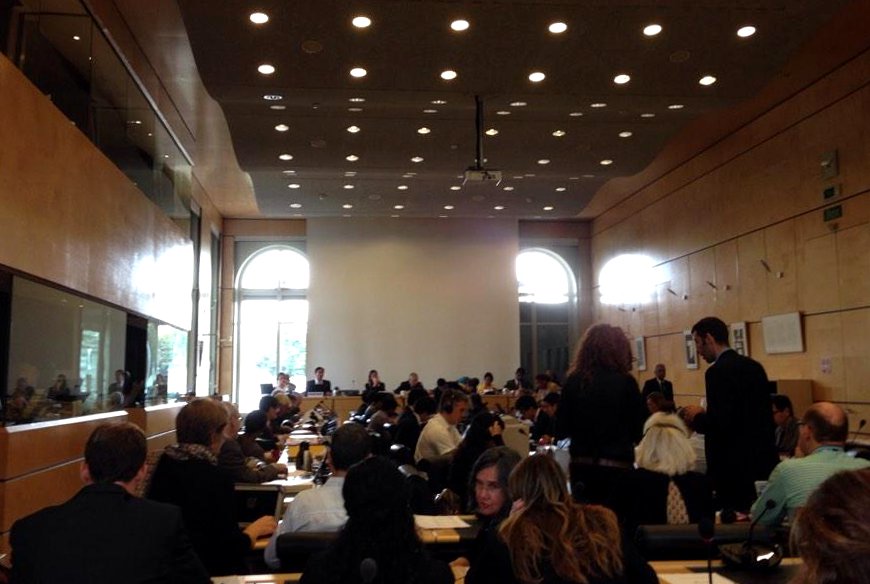 |
| Photograph Tamil Guardian |
The Human Rights Committee on Wednesday concluded its review of Sri Lanka’s adherence to the International Covenant on Civil and Political Rights (ICCPR), with many key questions left unanswered by the Sri Lankan delegation.
On day two of the review, the committee questioned Sri Lanka further on its response to the list of issues raised by the experts.
Find more on yesterday's events here: Sri Lanka faces tough questions from UN Human Rights Committee
Yuval Shany of the Hebrew University of Jerusalem questioned Sri Lanka on reports that streets and villages in the Tamil homeland had their names changed in Sinhalese, temples destroyed and thousands of acres of Tamil and Muslim land appropriated by the military. He pointed out that Tamils were not able to commemorate their dead on Mullivaikal Day, on May 18.
Shany also questioned why the case of the Trinco 5 dragged on for so long and why it took Sri Lanka 7 years to summon its first witnesses.
While agreeing with Sri Lanka’s position on a military inquiry can be used to investigate violations, he asked whether it was plausible for the military to initiate an inquiry into polices which were enacted at the highest level of the ministry of defence.
Professor of international law, Gerald Newman, said reports of torture of detainees by both police and military continued to emerge. He said there are medical documents which prove beatings, burnings and sexual violence perpetrated against detainees. Newman said Sri Lanka failed to give data on prosecutions against torture as requested by the committee, which strengthened his view that impunity prevails in the country.
Newman also noted Sri Lanka’s response on unlawful detentions, in which the delegation said a draft bill had been produced. However he expressed his scepticism, saying having a draft bill does not mean it will become law, and even if it became law, it is not as if police are currently punished for violating existing laws.
The chairman of the committee Sir Nigel Rodley criticised Sri Lanka’s response to the experts’ questions regarding the UN Panel of Experts report.
Sri Lanka’s UN envoy Ravinath Aryasinha disputed the legitimacy of the report, saying the panel did not have any status in international terms and that it was unfortunate Sri Lanka was asked to respond to the “unsubstantiated” allegations in the report. Aryasinha said Sri Lanka would protest any reference to the report to avoid giving it any credence.
Sir Nigel Rodney, clearly irked by the statement, pointed out to the Sri Lankan delegations that the members of the Human Rights Committee were experts in their fields and they are free to refer to reports as they see fit. He said it was not good use of Sri Lanka’s time to question the authenticity of the reports used by the committee experts.
Vice-chair of the committee Yuwi Iwasawa questioned Sri Lanka on its record since the end of the armed conflict. He said one would expect that the situation in the country would imporve however from the evidence before the committee the human rights situation seems to have worsened.
Committee member Anja Seibert-Pohr probed Sri Lanka on harassment against journalists, including public defamation by state media agencies. She said that although Sri Lanka pointed to judicial remedies available, these were insufficient to protect journalists. Seibert-Pohr pointed out that Sri Lanka should be actively combating the harassment of journalists, instead of putting the onus on the victims to take actions.
Seibert-Pohr, who is also chair of international law at the University of Goettingen, also said the committee had information that security forces intervened in private and public assemblies in the Northern Province, including by restricting events commemorating those who died in the armed conflict.
Professor of human rights Cees Flinterman pointed out that the actual number of IDPs was much higher than the number quoted by the Sri Lankan government, adding that 23,000 IDPs were unable to return to their homes due to occupation of their land by the military.
During Sri Lanka’s response to the questions, Aryasinha said he objected to the use of the term “Tamil homeland” by the committee as no region of Sri Lanka is reserved for a particular community.
The envoy also objected to the questions about the commemoration of Mullivaykal Day, saying that it was only celebrated to commemorate the leader of the Liberation Tigers of Tamil Eelam.
“Whether it is the norm that terrorist leaders are venerated in this civilised society is a question i leave to you learned ladies and gentleman to answer,” he said, adding that there was a sense of gorification of terrorism on this day.
The Sri Lankan delegation further rejected the allegations of media repression and torture, saying that the government maintained a “zero-tolerance policy” on torture.
The delegation also said that a large number of those that remained displaced did not own land in their villages or towns and as such could not be resettled.
Sri Lanka was not able to respond in full as time for the review was limited, but the government is required to provide written responses to the questions within 48 hours.
We need your support
Sri Lanka is one of the most dangerous places in the world to be a journalist. Tamil journalists are particularly at threat, with at least 41 media workers known to have been killed by the Sri Lankan state or its paramilitaries during and after the armed conflict.
Despite the risks, our team on the ground remain committed to providing detailed and accurate reporting of developments in the Tamil homeland, across the island and around the world, as well as providing expert analysis and insight from the Tamil point of view
We need your support in keeping our journalism going. Support our work today.
For more ways to donate visit https://donate.tamilguardian.com.

